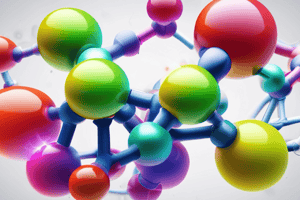Podcast
Questions and Answers
What type of bonds do atoms form in organic chemistry through sharing electrons?
What type of bonds do atoms form in organic chemistry through sharing electrons?
- Metallic bonds
- Hydrogen bonds
- Covalent bonds (correct)
- Ionic bonds
Which of the following properties can be influenced by the molecular structures formed by covalent bonds in organic compounds?
Which of the following properties can be influenced by the molecular structures formed by covalent bonds in organic compounds?
- Magnetic properties
- Density (correct)
- Electrical conductivity
- Viscosity
What type of reactions in organic chemistry involve the breaking and formation of chemical bonds?
What type of reactions in organic chemistry involve the breaking and formation of chemical bonds?
- Chemical reactions (correct)
- Physical reactions
- Catalyzed reactions
- Thermal reactions
Which of the following is NOT a common type of reaction studied in organic chemistry?
Which of the following is NOT a common type of reaction studied in organic chemistry?
Why is it important for organic chemists to understand the various processes involved in organic materials?
Why is it important for organic chemists to understand the various processes involved in organic materials?
Flashcards are hidden until you start studying
Study Notes
Organic Chemistry is one of the most fundamental branches of chemistry, dealing with carbon and its compounds. Atomic structure plays a central role in this field, where chemists study how atoms bond together into molecules through covalent bonds, which involve sharing electrons between atoms. These bonds can form complex networks called molecular structures, leading to various properties such as boiling points, melting points, solubility, density, and refractive indexes. Chemical reactions occur when these bonds break and new ones form, allowing organic compounds to react under different conditions to produce useful products. Some common reactions studied by organic chemists include addition, elimination, substitution, rearrangement, oxidation, reduction, and hydrolysis. Understanding these processes allows us to synthesize, analyze, and manipulate organic materials effectively.
Studying That Suits You
Use AI to generate personalized quizzes and flashcards to suit your learning preferences.




